
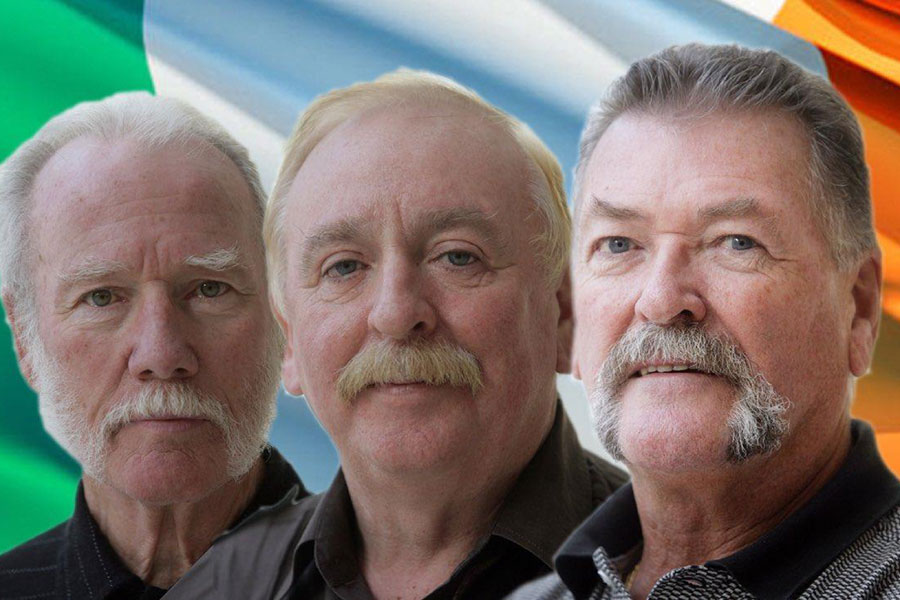
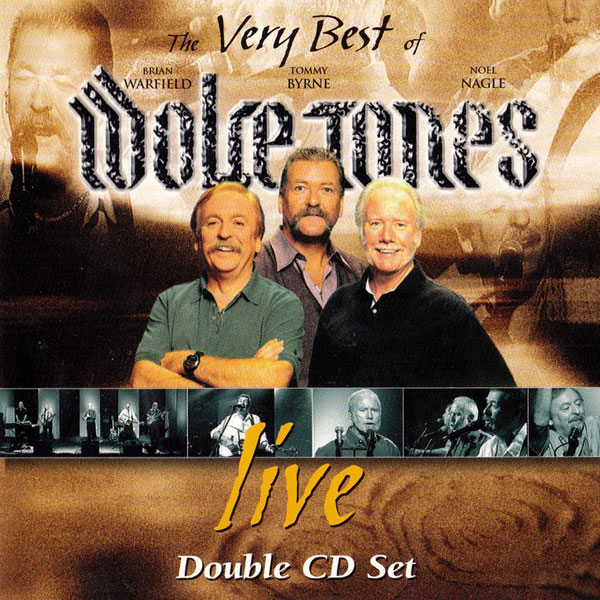 |
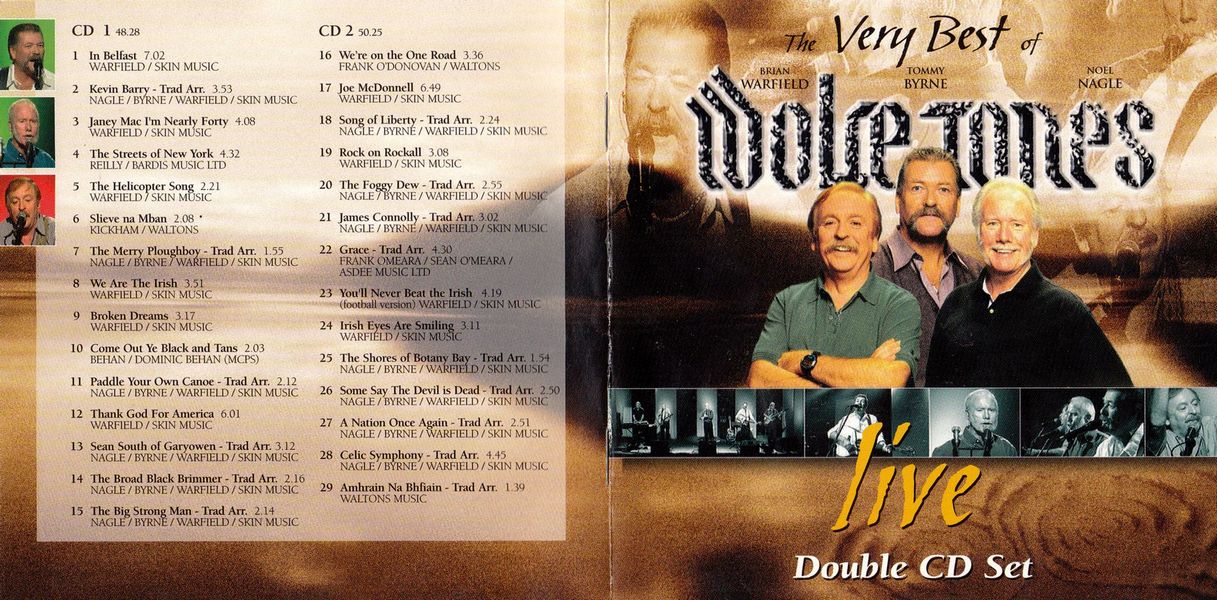
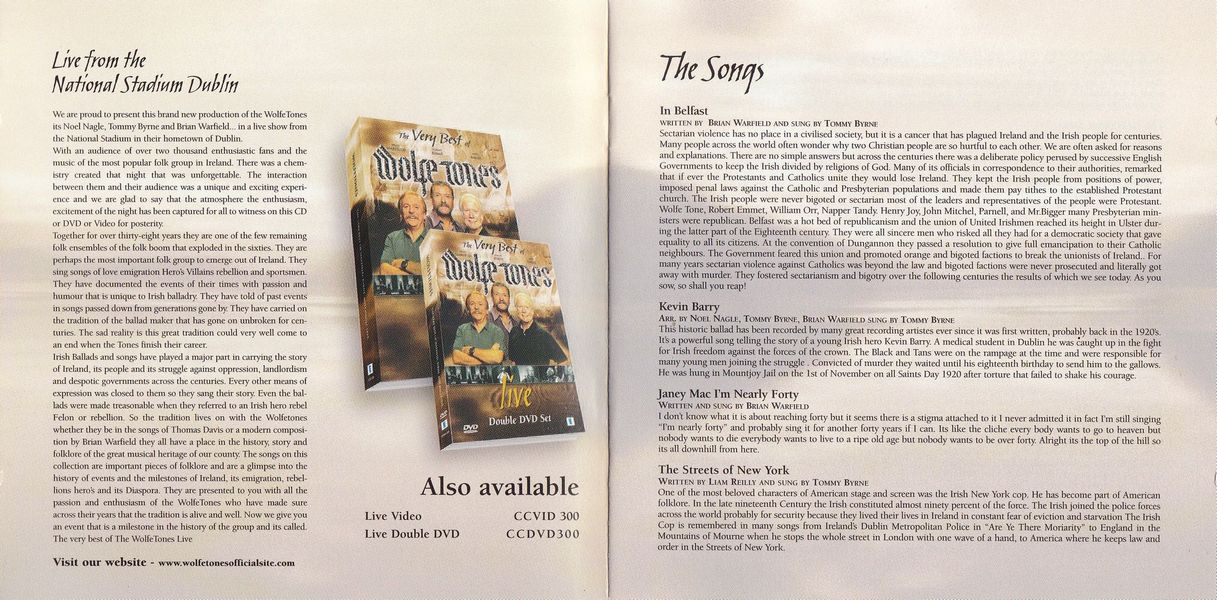
|
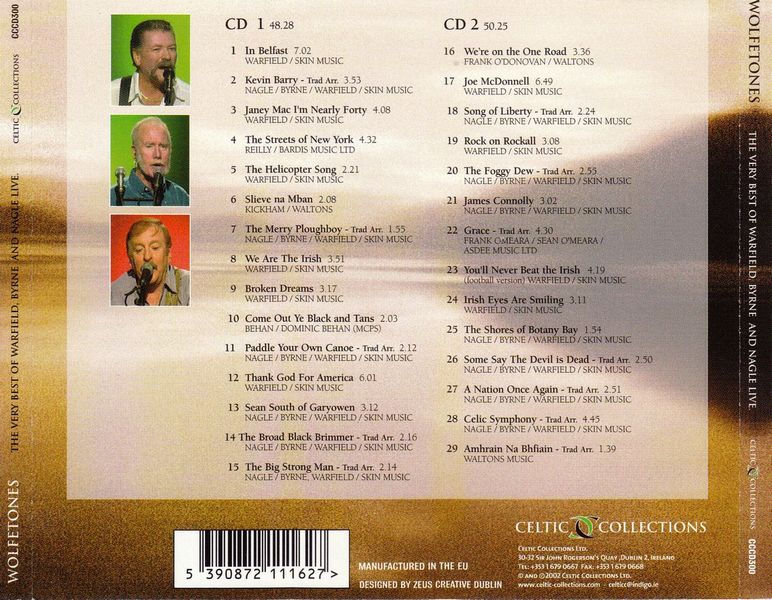
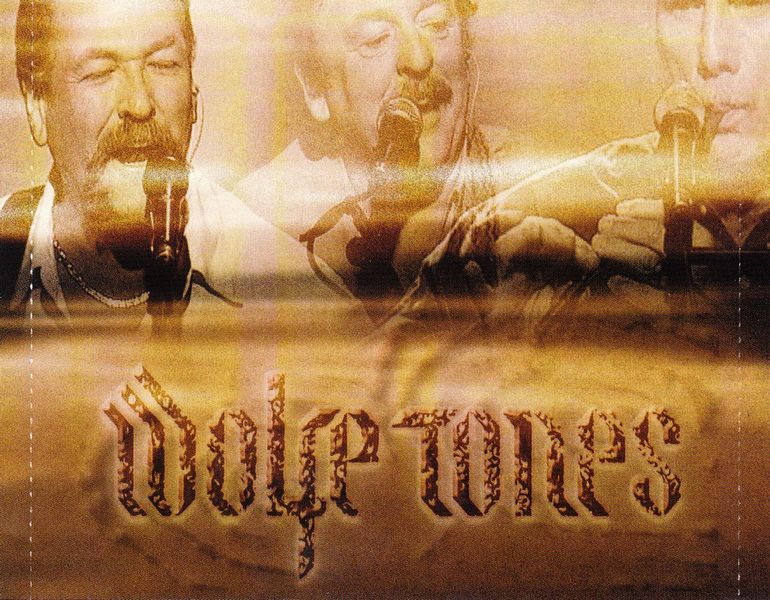
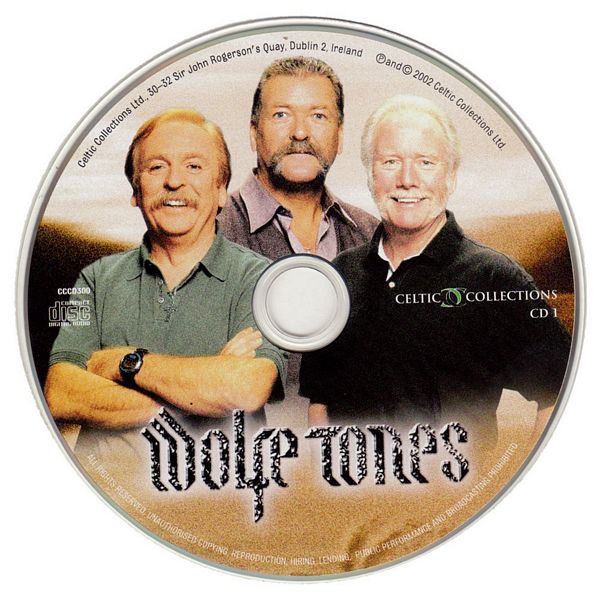
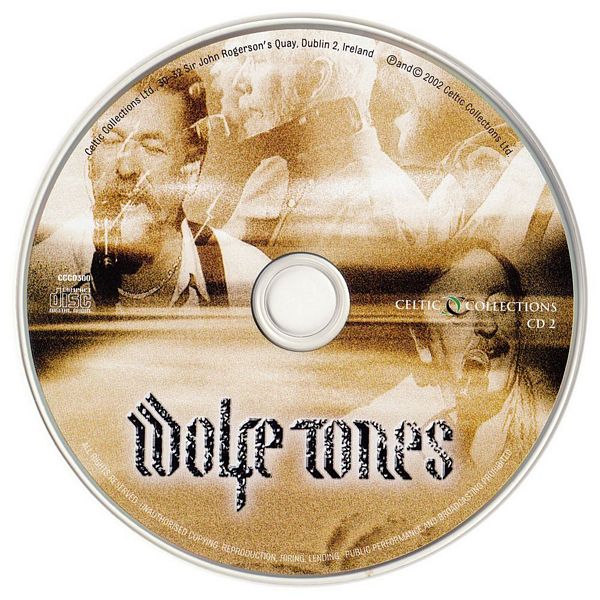
|
| more images |
Sleeve Notes
Live from the National Stadium Dublin
We are proud to present this brand new production of the WolfeTones its Noel Nagle, Tommy Byrne and Brian Warfield … in a live show from the National Stadium in their hometown of Dublin.
With an audience of over two thousand enthusiastic fans and the music of the most popular folk group in Ireland. There was a chemistry created that night that was unforgettable. The interaction between them and their audience was a unique and exciting experience and we are glad to say that the atmosphere the enthusiasm, excitement of the night has been captured for all to witness on this CD or DVD or Video for posterity.
Together for over thirty-eight years they are one of the few remaining folk ensembles of the folk boom that exploded in the sixties. They are perhaps the most important folk group to emerge out of Ireland. They sing songs of love emigration Hero's Villains rebellion and sportsmen. They have documented the events of their times with passion and humour that is unique to Irish balladry. They have told of past events in songs passed down from generations gone by. They have carried on the tradition of the ballad maker that has gone on unbroken for centuries. The sad reality is this great tradition could very well come to an end when the Tones finish their career.
Irish Ballads and songs have played a major part in carrying the story of Ireland, its people and its struggle against oppression, landlordism and despotic governments across the centuries. Every other means of expression was closed to them so they sang their story. Even the ballads were made treasonable when they referred to an Irish hero rebel Felon or rebellion. So the tradition lives on with the Wolfetones whether they be in the songs of Thomas Davis or a modem composition by Brian Warfield they all have a place in the history, story and folklore of the great musical heritage of our county. The songs on this collection are important pieces of folklore and are a glimpse into the history of events and the milestones of Ireland, its emigration, rebellions hero's and its Diaspora. They are presented to you with all the passion and enthusiasm of the WolfeTones who have made sure across their years that the tradition is alive and well. Now we give you an event that is a milestone in the history of the group and its called, The very best of The WolfeTones Live.
The Songs
In Belfast — sung by Tommy Byrne
Sectarian violence has no place in a civilised society, but it is a cancer that has plagued Ireland and the Irish people for centuries. Many people across the world often wonder why two Christian people are so hurtful to each other. We are often asked for reasons and explanations. There are no simple answers but across the centuries there was a deliberate policy perused by successive English Governments to keep the Irish divided by religions of God. Many of its officials in correspondence to their authorities, remarked that if ever the Protestants and Catholics unite they would lose Ireland. They kept the Irish people from positions of power, imposed penal laws against the Catholic and Presbyterian populations and made them pay tithes to the established Protestant church. The Irish people were never bigoted or sectarian most of the leaders and representatives of the people were Protestant. Wolfe Tone, Robert Emmet, William Orr, Napper Tandy. Henry Joy, John Mitchel, Parnell, and Mr. Bigger many Presbyterian ministers were republican. Belfast was a hot bed of republicanism and the union of United Irishmen reached its height in Ulster during the latter part of the Eighteenth century. They were all sincere men who risked all they had for a democratic society that gave equality to all its citizens. At the convention of Dungannon they passed a resolution to give full emancipation to their Catholic neighbours. The Government feared this union and promoted orange and bigoted factions to break the unionists of Ireland. For many years sectarian violence against Catholics was beyond the law and bigoted factions were never prosecuted and literally got away with murder. They fostered sectarianism and bigotry over the following centuries the results of which we see today. As you sow, so shall you reap!
Kevin Barry — sung by Tommy Byrne
This historic ballad has been recorded by many great recording artistes ever since it was first written, probably back in the 1920's. It's a powerful song telling the story of a young Irish hero Kevin Barry. A medical student in Dublin he was caught up in the fight for Irish freedom against the forces of the crown. The Black and Tans were on the rampage at the time and were responsible for many young men joining the struggle. Convicted of murder they waited until his eighteenth birthday to send him to the gallows. He was hung in Mountjoy jail on the 1st of November on all Saints Day 1920 after torture that failed to shake his courage.
Janey Mac I'm. Nearly Forty — sung by Brian Warfield
I don't know what it is about reaching forty but it seems there is a stigma attached to it I never admitted it in fact I'm still singing "I'm nearly forty" and probably sing it for another forty years if I can. Its like the cliche every body wants to go to heaven but nobody wants to die everybody wants to live to a ripe old age but nobody wants to be over forty. Alright its the top of the hill so its all downhill from here.
The Streets of New York — sung by Tommy Byrne
One of the most beloved characters of American stage and screen was the Irish New York cop. He has become part of American folklore. In the late nineteenth Century the Irish constituted almost ninety percent of the force. The Irish joined the police forces across the world probably for security because they lived their lives in Ireland in constant fear of eviction and starvation The Irish Cop is remembered in many songs from Ireland's Dublin Metropolitan Police in "Are Ye There Moriarity" to England in the Mountains of Mourne when he stops the whole street in London with one wave of a hand, to America where he keeps law and order in the Streets of New York.
The first people we befriended in America were all New York city cops or in the academy training to be one. They were a fine bunch of men mostly of Irish decent. They adopted us and showed us their city, brought us into their homes and families. So when this song came up it was a natural for us. It was released in 1981, it reached the number one slot in the Irish charts in early July and remained there for some time. It is one of the most popular of the current songs of emigration and deserves its place as a standard of Irish balladry.
The Helicopter Song — sung by Brian Warfield
Our first number one record was the Helicopter Song which became the fastest selling record of all time in Ireland. It went straight into the number one slot but was the only number one record in the history of the chart show not to be played. It created a sensation at the time and sold over thirty thousand units in three days. The escape took place in Mountjoy Jail on Halloween. There had just been a change of government and the warder exclaimed to the press reporters that he thought it was one of the new ministers coming to the jail for an inspection. It was one of the most spectacular prison escapes of all time so it had to be recorded in song.
Slieve na Mban (The Mountain of the Women) — sung by Tommy Byrne
Charles J Kickham poet novelist and Patriot was bom in Mullinahone Co Tipperary on the 9th. of May 1828, and died in Dublin 22nd of August 1882 in his 54th year. He was out in the Young Ireland rising of ‘48 and at Smith O'Brien's request he rang the chapel bell to summon the people. 6,000 he said answered the call armed with fowling pieces, pitchforks and rifles. He said they were ready to face death without question. He was a member of the supreme council of the Fenian Brotherhood and became its president. Author of three well known stories of Irish life and manners, he wrote for The Nation The Celt The Irishman, The Shamrock Fenian Organ The Irish People, He was sentenced to 14 years imprisonment which broke his health. Home Longings better known as Slievenamon was first published in the Celt. This song became a huge hit for the group in the late 60's and has become a standard ever since.
The Merry Ploughboy — sung by Noel Nagle
A hugely popular song in the early sixties which was recorded by many Irish groups and singers. We first recorded it in 1965 and it was on an E.P entitled "The Teddy Bears Head". Everyone loved the song and it was a number one in 1966, the fiftieth anniversary of the Easter Rising.
We Are The Irish — sung Tommy Byrne
This the complete story of Irish emigration and explains the many reasons why the Irish people left the country they loved. Scattered to the four winds over the centuries for various reasons they found a home in many lands. The devastation caused by Henry the Eight and Elizabeth the First drove thousands from their homes and lands to seek refuge elsewhere. The wild geese fled in the 17th Century and made their way to Spain, France or the new world in the America's. Thousands of men and boys were sent as slaves by Cromwell to the colonies the Carolinas and the West Indies. The soldiers of the Irish army chose the standards of France and Spain following the Treaty of Limerick. The weavers and spinners of Ulster were driven away by high taxes and bad government during the 18th. Century. The economic refugees across the centuries were the results of the navigation laws and legislation passed in London favouring the English Industries and Merchants at the expense of Ireland's, thus stifling the woollen, beef and fishing industries. These industrialist and Merchants were forced to find an outlet for their enterprise abroad. The Ship owners and merchant fleet were driven abroad by these laws many to the maritime states. The transportation of the so-called convicts the Whiteboys, agrarian and political prisoners to the penal colonies in the Americas and Australia. There was a mass exodus of people during the 19th. Century. It commenced following the collapse of the repeal movement. Hundreds of thousands of disappointed people chose to seek a home and better way of life in the newfound freedom of the United States. The floodgates opened when millions were driven away by Hunger and evictions following the failure of the potato crops 45- 50. It was the greatest exodus of people in the history of mankind. During this great holocaust which later became known as The Great Famine many were fleeing Ireland it was said as if they were perused by wild animals. The exodus reached catastrophic proportions in the 50's and so commenced a chain of emigration that was to last until the present day. It is believed there are over 90 million people world-wide who claim Irish heritage and I know many more who wished they were Irish. All in all sure "We are the Irish." A great family all over the world.
Broken Dreams — sung by Tommy Byrne
When the Irish crossed the water to England and Scotland they were invariably met with resentment persecution discrimination racialism and religious intolerance. They got the worst housing and jobs that no one else would do. They came in conflict with local labour that felt the Irish emigrant undermined their wage rates. The results were the Irish banded together for their own protection.ln Scotland they rallied around a soccer football team called Glasgow Celtic. At the football park each week they could meet their masters as equals. Whenever there was a grudge or resentment against the Irish the Celtic supporter became the target. The evil of sectarian bigotry and religious intolerance has remained with us to this present day.
In recent times many Celtic supporters were attacked beaten and brutally murdered because sectarian bigots identified them as such. Mark Scott aged 16 got his throat slashed because he wore a Celtic shirt. [May 2000] Laurence Haggart who had a promising career as a football player with Celtic was also beaten and murdered. Another young Celtic fan Thomas Mc Fadden was stabbed in the heart after watching a cup final game at home. He was on his way to a chip shop when two bigots, murdered him just for wearing a Celtic shirt They carried weapons and used violence against an innocent young man, he retaliated not with violence but with a song. As a result of this incident they tried to ban the singing of Irish songs when the real problem went unnoticed, religious intolerance that has plagued Ireland and the Irish wherever they settled for centuries.
Only last July a young man Gerard Lawlor was killed In Ardoyne Belfast when he was identified as a Catholic by the fact that he wore a Celtic strip
Come Out Ye Black and Tans — sung by Noel Nagle
The most hated regiment in the British army were undoubtedly the Black and Tans. They were responsible for many atrocities in Ireland during their campaign of terror. They were an auxiliary police force 2000 in all brought in on March 1920 to supplement the 8000 regular R.I.C. They were recruited from war hardened soldiers to combat Michael Collin's IRA successes and as Lloyd George said to make it hell for rebels to live in. They got their name from the famous wild pack of dogs in Limerick called the Black and Tans. They wore a strange mix of uniform dark green tunics, khaki trousers, Black belts, berets with a tassel on top and civilian felt hats. They raped murdered burned tortured and looted all over the south and west of Ireland. They knew nothing and cared little about Ireland and their mission was to frighten and terrorise the Irish people into defeat and submission.
Paddle Your Own Canoe — sung by Brian Warfield
Do your own thing, why not you have only one life to live its not a dress rehearsal, so enjoy it while you can its later than you think and Paddle your own canoe.
Thank God for America — sung by Tommy Byrne
It has been said that there were never two countries more intertwined than Ireland and America with ties of blood and the love of liberty and freedom, Saint Brendan it is believed made his way across the western ocean in the sixth century and set his foot on that continent. Little did he know that it was to become home to many millions of his countrymen over the centuries. It was remembered in Boston when they were sending food to Ireland during the famine, that the early settlers on the Cape had received help from Ireland during their time of need. The Irish supported Washington in his efforts for independence over 50% of his forces were Irish. The navy was founded by John Barry of Wexford and many of his countrymen supplied their ships like the O'Brien's of Maine to the services of freedom. They helped to shape the laws and the constitution and to nurse the new republic to maturity. They fought in the war of 1812 and sacrificed many of our sons in the cause of freedom. By 1850 over 4 million Irish lived in the US alone, one sixth of the population. During the great hunger, America received one and a half million people into its bosom and sent food and assistance across the Atlantic. In the civil war they fought on both sides and were loyal to the territories they lived in. They built canals and railways across the land, built cities and pioneered trails all across the land.
Seán South of Garyowen — sung by Noel Nagle
The story of the young Limerick man who died during the border campaign of 56. He was killed by gunfire in a raid on a army post on New Years Eve. He fell with his comrade Fergus O'Hanlon who inspired Dominic Behan to write the song The Patriot Game.
The Broad Black Brimmer — sung by Noel Nagle
Once again the story of a son admiring with pride the uniform worn by his father in past battles. This was a great favourite in the pubs around Inchicore as long as I can remember. Noel collected it from Hughie Hogarty and its become very much his song.
The Big Strong Man — sung by Noel Nagle
I sang this song in the boy scouts and it too was a favourite in the pubs. I was told by one the older generation that they sang it on the bus going to school from the new scheme of houses in Crumlin. These were built in the thirties to re-house the people from the unhealthy overcrowded tenements in Dublin.
Were on the One Road — sung by Brian Warfield
This was one of the most popular songs at parties in Dublin. Written by Frank O'Donovan during the time known as the emergency in Ireland … . but as the 2nd World War to others. It is inspirational and supportive of Ireland's stance at the time. Isolated and alone a neutral state watching the world at war this song kept the spirits of the people up. "Were On The One Road, it maybe the wrong road but were together now who cares"
Joe McDonnell — sung by Tommy Byrne
Brian wrote this song on the morning Joe McDonnell died he said "I had just heard it on the news that another Hunger striker was dead and I was shocked, saddened and angry". How could people let this happen? They weren't asking for much, there should have been a solution. They asked for the right to wear their own clothes to associate with other prisoners in the same position as they wanted the right to the status of political prisoners, but the obstinate stubbornness of Thatcher and her government refused to give an inch. Then one by one they died unnecessarily the world watching and no one crying halt or stop. In anger I put pen to paper and continued writing for hours until the song was finished. I always feel that Joe McDonnell spoke through me on that morning the story just flowed. I then took up my guitar and composed the melody as I did the tears ran down my face. I then put the melody and words together and when I finished I broke down and cried. There were ten young men who died on that hunger strike that year, Joe McDonnell aged 30 was the fifth man to die. Those before him were Bobby Sands aged 27, Francis Hughes 25, Raymond McCreesh 24, Patsy O Hara 24, and those after him were Martin Hurson 24, Kevin Lynch 25 Kieran Doherty 25, Thomas McElwee 23 and Micky Devine 27. All brave men who deserve their place in the history of our country.
Song of Liberty — sung by Tommy Byrne
The Elusive prize of peace has eluded the Irish people for generations. Over the centuries they have seen very limited periods of peace in the country almost every generation suffered either wars, invasions, conquests, re-conquests, Land confiscations ejections, evictions, Famine or religious persecution. The song is written to the melody composed by Verdi. The words are supportive of peoples who have suffered because of powerful colonial nations imposing borders and boundaries across their lands not caring about the consequences of their actions. Take a close look at all the trouble spots and you will find that there was a colonial power there at some stage who left behind a mess and division. The children of the world are the future and our concern "For I hate to see children crying, we must stop all their suffering and dying, stand beside me for peace and for Liberty"
Rock on Rockall — sung by Brian Warfield
"Don't say I didn't tell you Its loaded with oil and gas off the coast of Donegal we've been telling you for years". We brought out this song in the seventies to highlight the potential of oil and gas off the north west coast. During the Cod War between England and Iceland we played a festival which was attended by one of the captains of the Icelandic fleet who enjoyed die song so much it was translated and sung by the crew as their theme song.
The English went to great lengths to claim the rock. They planted a flag which blew away they painted a flag on the rock but the seagulls covered it in shit and it can't be seen anymore. They had a squadie camp on it to say it was inhabited by them but we all know that it is Irish to the core.
The Foggy Dew — sung by Noel Nagle
On Easter Monday morning 1916 a small group of Irish volunteers took possession of the G.P.O. in Dublin and so began the Easter Rising. It was a force of roughly 1500 men and women who took on the might of the British empire. Over twenty thousand British troops were in or near the vicinity of Dublin at the time. A huge crowd gathered in Sackville St, now O'Connell St and listened to Padraic Pearse read the proclamation of the Irish Republic from the steps of Nelsons Pillar. "Irishmen and Irish Women in the name of God and of the dead generations from which she receives her old tradition of nationhood, Ireland through us, summons her children to her flag and strike a blow for Ireland." There were seven signatories of the document they were Thomas J Clarke, Seán McDiarmada, Thomas McDonagh, EH. Pearse, Eamonn Ceannt, James Connolly and Joseph Plunkett. The crowd scattered when the 5th. Lancers rode in among them to attack the G.P.O. Shots were fired and the Lancers dispersed, ten of them fell. The crowd reassembled again to watch the rising of the flag of die Irish Republic the tricolour of green while and orange appeared above the roof of the G.P.O. Mr Connolly and a few of his officers came out to look at it as it waved up there against the sky. James Connolly wrote a few days later when the flag was still flying. "For the first time in seven hundred years the flag of a free Ireland floats over Dublin City.
James Connolly — sung by Tommy Byrne
Margaret Skinnider a volunteer from Glasgow was posted to the College of Surgeons but brought despatches to and from the Post Office many times. The spirit in the Post office was always the same she said - quiet, cheerful and energetic. Whenever there came a lull in the fighting, the men would either sing rebel songs or lays dear to Irishmen the world over. Sometimes they knelt in prayer, Protestant and Catholic. A gay song would follow a solemn prayer. Soon the fighting was over and the few volunteers surrendered to the superior British force. They had made a brave stand for Ireland. They commenced the execution of the leaders at dawn on the 3rd May, 1916 Padraic Pearse was the first, Thomas McDonagh and then Tom Clarke. The following day they shot Joseph Plunkett and William Pearse Daly and O'Hanrahan. James Connolly was the last to be shot already weakened from his wounds had to be strapped to a chair and so came to an end the great labour leader and patriot. The poem before the song was written by Paddy McGowan and is the feelings of one of the men in the firing squad that shot him on that morning.
Brian Warfield has been playing music since he was 13 years old. He plays Banjo, Guitar and Harp with the Tones. He is the song writer of the group and has contributed most of the original material and hits over the years. He and Noel Nagle gave the name to the group in a pub in London and they have held onto it since then. The group has become a household name in Ireland. They are together for over 38 years and there is only one Wolfetones.
Brian was bom in Holies St Maternity Hospital Dublin on the 2nd April 1947 the second of four children all boys. We lived firstly in a one roomed flat at No 1 south Circular and at we moved to a new house in Bluebell when I was seven. I attended St. Kevin's Junior school and then the Oblate School Inchicore from there to James St. Christian Brothers. I studied to be a radio officer at Kevin's St and my wish was to go to sea and see the world.
Both my Parents were musical; my father was an excellent musician and played piano and mandolin. My Mother amused herself in the afternoons playing her favourite tunes both of them loved playing and singing. I can never remember a time without music or song in the Dublin of the 50's there was no television just the wireless. The variety of musical Knowledge we got from those programmes ranged from classical to light Opera from Hollywood to the Irish song and dance.
My early influences in music were the ordinary people my family and the music I heard on Radio. My favourite song was The Black Hills of Dakota and my favourite singer was Doris Day. My favourite Irish singer at the time was Brendan O'Dowda. I loved the Ceili music the dance and the song so I went to learn the tin whistle with Paddy Ban O'Brinn in Church St. I enjoyed this experience very much Noel Nagle and Finbar Furey were in the class. Noel lived just around the comer from us and friend of Noels sister Tony Butler introduced us to the fleadh ceoil's. We went to one in Milltown Malbay Co Clare shortly after and we had a fantastic time. The music the song the dance the atmosphere the craic, we were hooked. After that Irish music and song and story became our passion.
Noel and I immigrated to England in 1963 and played the folk clubs, mainly around London and Essex. We stayed there for almost a year returned to Ireland in 64 and played the folk clubs around Dublin. We did some Radio and Television work and were slowly getting recognised. We were signed to Fontana a major record label in early 64. We met Tommy at a fleadh in Elphin Co Roscommon in a bar called McDermott's and he joined us in Oct of that year. It's a long story after that and there is not enough space to tell it all here.
I was married in 1968 to June Radburn who I met in London in 64. She was originally from Drumcondra Dublin. I have four children Siobhan, Ciaran, Laragh and Ruairi and live in the hills of Co Wicklow
Brian has probably written over two hundred songs at least half of them have been recorded mostly by the Tones. He composed music for an R.T.E. radio production of Shakespeare's As You Like It Composed a suite of music called Celtic Exodus remembering the Irish Holocaust, The Great Famine. He has written songs about every aspect of Irish life and documented the story of major happenings and events that occurred in Ireland during our lifetimes. He has composed numerous hits and three number ones and I hope he will continue to compose and write as long as he can, there is much to tell and Ireland's story is continuously changing. His passion is music and his mission is to tell the story of Ireland.
Noel Nagle
My father was the first big musical influence in my life. He taught pipes and drums, and had a very successful band called New Eire Girls Pipe Band. I began playing the guitar first, then moved on to the banjo, until I finally settled on the tin whistle. I also played the Uillean Pipes, and a great pipe player Dan O'Dowd made my first practice set for me.
I was born in Dublin and grew up in Drimnagh. In the early 50s we had to move to Bluebell, another Dublin suburb, to accommodate our big family of twelve children. I went to school in St. Michaels Christian Brothers School in Inchicore. It was here that I first learned and became interested in the history of Ireland. And it was the Christian Brothers who instilled the love of Irish music and rebel songs in me. The gymnasium at the school was where the 1916 Rising leaders were brought after their arrest and spent their first night of detention there, before being taken to nearby Kilmainham Jail where they were subsequently executed for their part in the Rising.
When I finished school, I spent nearly every weekend travelling to the various Fleadh Ceoils around the country and quickly acquired a great love for traditional Irish music. It was one such weekend, myself and Brian were in Roscommon at a fleadh when we met Tommy Byrne, and that was the start of the Wolfe Tones. Since then we have gone from strength to strength, we have sold millions of albums and travelled all over the World.
I married my wife, Marie in 1970, and we have four children, Ciara, Keith, Carl, and Catherine, and we also have one grandchild. I now live in Wicklow, the "Garden of Ireland". I still enjoy the gigs, playing performing and recording, and hope to continue for as long I can …
Tommy Byrne
Bom and reared in the Liberties in the 40s/50s, and the eldest of eleven children, I bought my first guitar in 1962 and taught myself to play. My early influences were Joan Baez and the Clancy Brothers who were making it big in the US at the time, and I fell in love with folk music Irish and American. By 1966 there were at least 800 ballad groups, an*d the folk boom had really taken hold. I began performing in the various folk clubs in Dublin and at the fleadh cheoils around the country. It was at a fleadh in Elphin, Co. Roscommon, on Easter weekend, 1964 that I first met Brian Warfield and Noel Nagle, who were members of a ballad group called the Wolfe Tones. We played and sang together all weekend, and within the year I had left my job in the Guinness brewery and joined the group full time - thank God I have never looked back!
Since then we have performed the World a few times over, and in some of the most prestigious venues in the biggest cities in the World. These include, Carnegie Hall, New York, The Royal Albert Hall, London, The Olympia, and I must mention The Apollo, Glasgow, the most memorable gig I have ever performed. We have played in about 40 states in the US, Australia, and all over the UK and Ireland and have played alongside artists like John Denver, Kris Kristofferson, Glen Campbell, Joan Baez, and Status Quo.
On a personal note, I married my wife, Kate, 34 years ago, we have two children, Thomas and Emma, we have one grandchild, "Vivienne" whom I adore, and we have another one on the way. These days, having slowed down a little from the hectic days of the 60s, 70s, 80s and 90s, 1 now enjoy golfing, walking and gardening with my wife. I am an avid sports fan, particularly Hurling (the best game in the world), and I must admit to enjoying a few pints down the local with friends.
For the future, I hope to continue performing and recording, at least for another few years!